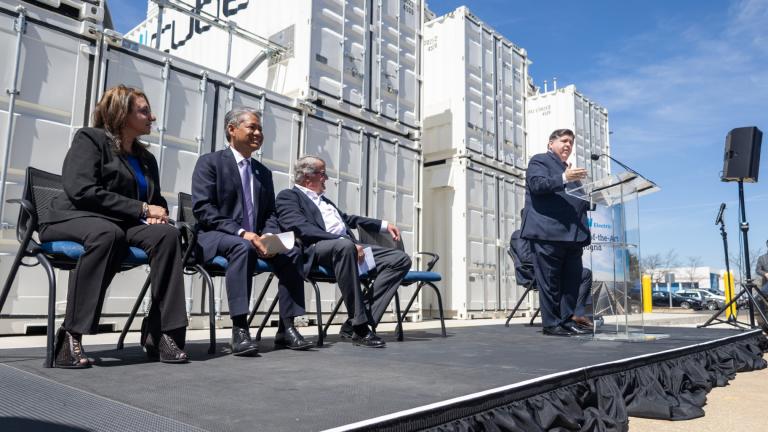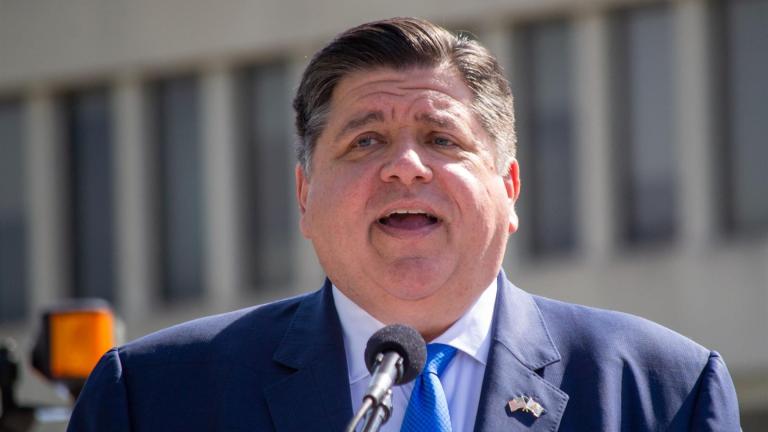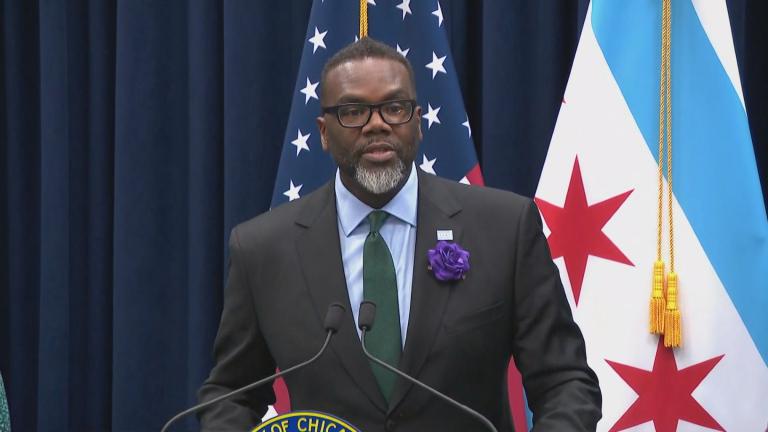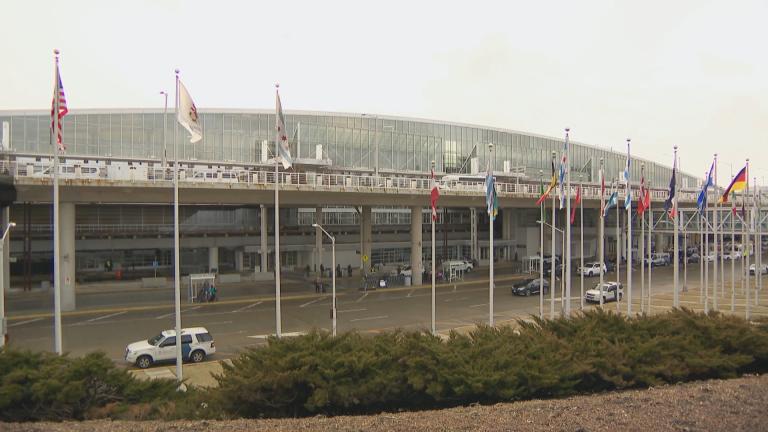Gov. J.B. Pritzker in March sunk $35 million into his campaign fund – not a huge expense given his personal fortune but assumed as a sign that he’s gearing up to campaign for a second term.
But the Chicago Democrat Thursday said he hasn’t decided whether he’s running.
Even so, Pritzker said the Republicans who’ve already lined up to run against him aren’t fit for the office.
“Many of them have fought against the [COVID-19] mitigations, have sued on the side of Donald Trump and all of his lies. These are folks who really shouldn’t run the state of Illinois because they don’t seem to care about the working families of Illinois — they haven’t over the last year as a result of their failure to push mitigations forward, to stand up for those mitigations. A couple of ‘em not wearing masks and telling other people not to,” Pritzker said. “I just think that they’re not qualified to be governor as a result of how they reacted to the pandemic.”
Republicans who have thus far declared their candidacy for governor are State Sen. Darren Bailey of Xenia; suburban business owner Gary Rabine, the founder of exterior facilities management company Rabine Group; and former state Sen. and ex-Marine Paul Schimpf of Waterloo.
Bailey and Rabine held mask-less indoor campaign events during the height of the pandemic, and Bailey sued the governor in a failed attempt to void Pritzker’s executive orders mandating COVID mitigations.
Other names are floated by political prognosticators as potential contenders include Congressmen Rodney Davis and Adam Kinzinger.
Their decision may depend on how Democrats draw boundaries of new congressional districts – if they’re drawn so Davis or Kinzinger have no real shot at going back to Washington, either may set their sights on the governor’s mansion in Springfield instead of D.C.
Pritzker said he hasn’t had much time off to talk with his family about making a decision on his own political future.
“It’s very important to me to engage my whole family at the same time. And so that’s a conversation that we’ll be having,” he said, noting that he’s got teenagers.
The impact of his being governor weighs on them and wife M.K., he said.
“There have been a lot of unfair, you know, accusations against my daughter. These are all things that we weigh in the process of making a decision,” Pritzker said.
He said he will make a decision “reasonably shortly.”
It will likely take until summer -- three-and-a-half months more than usual -- before nominees from either party are decided, no matter who joins the governor’s race.
An elections measure, SB 825 just approved by the General Assembly but which needs Pritzker’s signature before becoming law, would move the primary back from mid-March to June 28.
The pushed-back primary will allow state lawmakers to wait for census data to arrive later this summer to draw new U.S. House districts, without leaving Congressional candidates in a time crunch to gather the necessary petition signatures to make it on the ballot.
The 2022 general election remains Nov. 8.
While Pritzker wasn’t officially on the November 2020 general election ballot, his signature “fair tax” initiative was.
Voters at the time rejected his bid to amend the constitution to allow for graduated income tax rates, such that varying tax rates could be imposed on households based on their income brackets.
The governor said he does not plan to try again next year.
“I do think that we need a more fair tax system in Illinois,” he said. “We made it a little bit fairer in this budget, this year, by cutting those corporate loopholes, corporate welfare. And those are the wealthiest companies in the state of Illinois, the ones who benefited greatly during COVID-19, during the pandemic.”
The Fiscal Year ‘22 budget, which Pritzker said earlier this week he will sign into law, and which would then take effect in July, eliminates tax incentives to the tune of more than $650 million annually.
Business groups, including the state manufacturer’s association and chamber of commerce, however, argue that it’s a short-sided move that will make Illinois even less hospitable to job-creators.
“After more than a year of disruption and difficulty, the governor and lawmakers did nothing to proactively support businesses across the state struggling to rebuild,” Illinois Manufacturers’ Association president Mark Denzler said in a press release. “Instead, they created hurdle after hurdle for job creators, putting in place a new law to dramatically increase litigation costs on manufacturers, hospitals, and doctors, eliminating $650 million in tax incentives designed to spur economic development, and pushing changes to our state constitution that would sharply limit the ability of businesses to negotiate with unions.”
Given that Illinois’ constitution requires income be taxed at a flat rate, the failure of the graduated income tax question leaves lawmakers with little room to reduce the tax burden of low-income households.
But not completely.
Advocates from a coalition of organizations including AARP Illinois, Economic Security for Illinois, the Heartland Alliance and the Latino Policy Forum campaigned (via House Bill 2792 and Senate Bill 2184) for an expansion of the Earned Income Tax Credit, or EITC, and an Earned Income Credit, which would have made tax relief eligible to more people, including immigrants without Social Security Numbers who file taxes using an Individual Taxation Identification Number (ITIN).
The groups expressed disappointment that the legislature, in which Democrats hold a supermajority, did neither.
“The General Assembly should be proactively seeking ways to curb rising poverty and inequality, yet they willingly neglected to bolster the Earned Income Credit, a proven anti-poverty tool. Our coalition will continue to fight to expand the Earned Income Credit so caregivers, immigrants, and childless workers have access to the relief they deserve,” Economic Security for Illinois director Harish Patel said in a statement.
In a one-on-one interview with WTTW News/Chicago Tonight, Pritzker said he looks “forward to working on that” but did not say why it didn’t happen this year.
“We have a federal Earned Income Tax Credit; I think we can do the same thing at the state,” he said.
Pritzker Wednesday signed a law that allows bars to give patrons a free drink if they show proof of vaccination from COVID-19 – one of several incentives the state’s pushing to encourage people to get inoculated.
The governor, who received the Johnson & Johnson vaccine in late March in Springfield, didn’t say whether he’d take his vaccination card to a bar.
But if he did get a shot for a shot? Pritzker said he’s partial to tequila.
The governor in recent days has also said he’s considering opening a lottery; chances at cash prizes or free tuition at a state university have successfully driven up vaccination rates in other states.
In his interview on Chicago Tonight, Pritzker also defended his actions following a government watchdog’s report that found a lack of preparation and of communication at the LaSalle Veteran Home contributed to a COVID-19 outbreak.
The inspector general’s audit found that the team at LaSalle requested asymptomatic employees show up for shifts even after they’d tested positive for COVID-19, lax masking by staff, and lacked a formal response plan even in October ‘20 when risks of transmission were well known.
At least 36 residents died in the final three months of last year.
“Let me start by reminding you that we’ve been in a global pandemic that has had no mercy, particularly on those who are elderly, those who are in nursing homes,” Pritzker said.
The governor said residents of the nearby community who weren’t wearing masks led to a high local rate of COVID-19 infections, which were brought into the LaSalle home.
“These are errors that were made,” he said. “This is a terrible, terrible tragedy, but we’ve been transparent from day one.”
Then-director of the state’s Veterans Affairs agency, Lynda Chapa La Via, resigned in January.
Pritkzer said her replacement, acting director Terry Prince, has done a “terrific job” and has tightened up procedures.
“A lot has been done to rectify the situation, it’s very important to me that we stand up and protect our veterans,” he said.
Resources:
SB 825: BRANCH POLLING PLACE-CO JAIL
HB 2792: INC TX-EARNED INCOME CREDIT
SB2184: INC TX-EARNED INCOME CREDIT
The Fall 2020 COVID-19 Outbreak at the LaSalle Veterans’ Home
Follow Amanda Vinicky on Twitter: @AmandaVinicky







